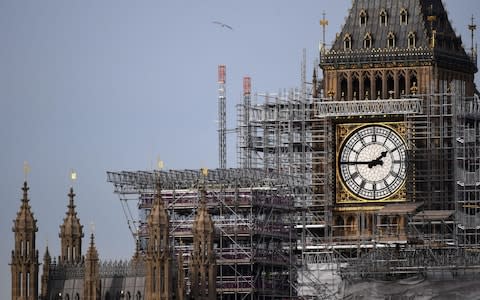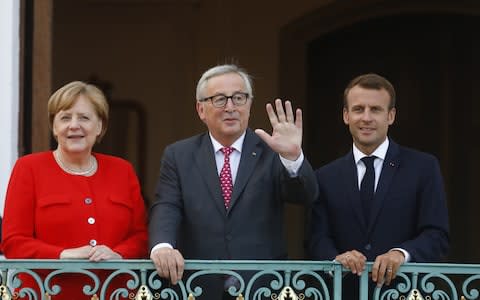EU plan to scrap clock changes could create Irish 'time border'

A European Commission plan to abolish daylight savings time in the EU may create a “time border” in Northern Ireland after Brexit.
Jean-Claude Juncker, the president of the European Commission, announced on Friday that his officials would put forward a bill abolishing the clock change "Millions,” he said, “believe that summertime should be all the time."
If Ireland agrees to the change, observers believe Northern Ireland could be forced to follow suit, which could mean Belfast and London operating on an hours difference for seven months of the year. Alternately, Northern Ireland and Ireland could be on different times, which could conceivably wreak havoc and confusion over the porous Irish border.
The Irish Department of Justice and Equality said it would study the commission’s proposal. “Minister Charlie Flanagan has an open mind on the issue,” a spokesman told The Telegraph.
Britain promised in December to keep Northern Ireland aligned with some EU rules to prevent the return of a hard border on the island of Ireland after Brexit. This so-called backstop clause would be triggered if alternative ways to avoid customs checks, such as a free trade agreement, fail.
The backstop calls for alignment on rules to do with the single market and all-Ireland economy. Observers believe that could arguably include the time.

Sammy Wilson, of the DUP, said: "It's just further proof, as if it were needed, that Brussels is bonkers. It wouldn't just be a time border, it would be a ticking time bomb under the proposed backstop arrangements which are contested."
The East Antrim MP, a member of the UK Parliamentary committee on Brexit added: "It's another reason why Theresa May should be putting it up to the EU that there will be no backstop. The Irish government can put the clocks back, or forward, whatever they like. That's up to them. But we in Northern Ireland will have the same time zone, the same rules, the same customs arrangements and same regulations as the rest of the UK. That's the bottom line for us."
The Commission said it was “not clear at this stage of the legislative process” whether the clock-changing bill would be among Brussels regulation followed by Northern Ireland after Brexit.
“I don't see the link between our undiminished quest to avoid a hard border in Ireland and our proposals which will come out in due course,” a commission spokesman said as he fielding questions over the 'time border' in Brussels.
Fears over the time border were raised as Dominic Raab, the Brexit Secretary, met with Michel Barnier, the European Union’s chief negotiator in Brussels. Mr Barnier warned that Britain's hopes of a trade deal could be scuppered unless it recognises EU protections for food and drink such as Parma Ham and Champagne after Brexit. “The EU's position is clear. Brexit should not lead to a loss of existing intellectual property rights," Mr Barnier said, “This protection is an international obligation. It must be clarified in the withdrawal agreement."

British moves to get clocks moved forward by an hour all year were scuppered in 2012 by Scottish MPs, despite attracting cross-party support including from the Liberal Democrats and tentative backing from David Cameron. Supporters said that the change would cut road deaths and energy use and boost jobs and tourism but Scottish National Party MPs warned it would force children to go to school on colder and darker winter mornings than usual.
The commission said an EU consultation on the daylights savings time held this year received 4.6 million responses, the highest ever received by the bloc. Preliminary results of the consultation found that 76 percent of respondents found changing the clocks twice a year to be a “negative” or “very negative” experience. 84 percent backed the abolition of the practice but Just 13,200 Britons responded to the consultation with two thirds of the respondents coming from Germany. Just 0.24 percent of Ireland’s electorate responded to the consultation.
Since 1996, all Europeans have been changing their clock forward by one hour on the last Sunday of March and by one hour backward on the last Sunday of October.
Once the commission has put forward a bill to make the change, it must be agreed by EU governments and the European Parliament before becoming law. The commission said that was unlikely to happen before the 29 March 2019 Brexit deadline, meaning it would not alter the time the UK leaves the EU.

 Yahoo News
Yahoo News 
